21 start with S start with S

Anne M. Khademian addresses the significance of the SEC for securities policy and uses the agency as a model for the study of bureaucracy and bureaucratic theory. She examines the interaction of bureaucrats, politicians and the White House, and connects early debates in the field of public administration with the contemporary arguments of rational choice scholars concerning independence.
The classic tension within U.S. federal agencies is between the need to hold bureaucrats politically accountable to elected officials and the need to delegate complex decision making to officials with “independent” expertise. In the SEC this tension is especially pronounced because of the agency's dependence on attorneys and economists. Khademian traces the development of a regulatory strategy from the creation of the SEC by FDR in 1934 to the present, examines the roles of SEC experts and their political overseers in Congress as they create policy, and evaluates the stability of that policy. Her study reveals how the tug-of-war between demands for accountability and giving freedom to expertise has affected the agency's evolution and its regulatory activities.

Shopping for Water begins by reviewing key dimensions of this problem: the challenges of population and economic growth, the environmental stresses from overuse of common water resources, the risk of increasing water-supply volatility, and the historical disjunction that has developed between and among rural and urban water users regarding the amount we consume and the price we pay for water. The authors then turn to five proposals to encourage the broader establishment and use of market institutions to encourage reallocation of water resources and to provide new tools for risk mitigation. Each of the five proposals offers a means of building resilience into our water management systems.
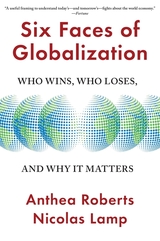
A Financial Times Best Book of the Year
A Fortune Best Book of the Year
A ProMarket Best Political Economy Book of the Year
An essential guide to the intractable public debates about the virtues and vices of economic globalization, cutting through the complexity to reveal the fault lines that divide us and the points of agreement that might bring us together.
Globalization has lifted millions out of poverty. Globalization is a weapon the rich use to exploit the poor. Globalization builds bridges across national boundaries. Globalization fuels the populism and great-power competition that is tearing the world apart.
When it comes to the politics of free trade and open borders, the camps are dug in, producing a kaleidoscope of claims and counterclaims, unlikely alliances, and unexpected foes. But what exactly are we fighting about? And how might we approach these issues more productively? Anthea Roberts and Nicolas Lamp cut through the confusion with an indispensable survey of the interests, logics, and ideologies driving these intractable debates, which lie at the heart of so much political dispute and decision making. The authors expertly guide us through six competing narratives about the virtues and vices of globalization: the old establishment view that globalization benefits everyone (win-win), the pessimistic belief that it threatens us all with pandemics and climate change (lose-lose), along with various rival accounts that focus on specific winners and losers, from China to America’s Rust Belt.
Instead of picking sides, Six Faces of Globalization gives all these positions their due, showing how each deploys sophisticated arguments and compelling evidence. Both globalization’s boosters and detractors will come away with their eyes opened. By isolating the fundamental value conflicts—growth versus sustainability, efficiency versus social stability—driving disagreement and showing where rival narratives converge, Roberts and Lamp provide a holistic framework for understanding current debates. In doing so, they showcase a more integrative way of thinking about complex problems.
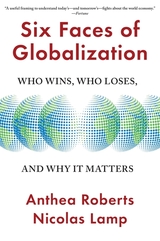
A Financial Times Book of the Year
A Fortune Book of the Year
“This book compels us to change our position, move out of our comfort zone, and see the world differently.”—Branko Milanovic, author of Capitalism, Alone
“A very smart book…not just about globalization, but also about the power and importance of narrative…Highly recommended.”—Anne-Marie Slaughter, CEO, New America
“An indispensable guide to how and why many people have abandoned the old, time-tested ways of thinking about politics and the economy. This is the book the world needs to read now.”—Richard Baldwin, author of The Great Convergence
When it comes to the politics of free trade and open borders, the camps are clear, producing a kaleidoscope of claims and counterclaims. But what exactly are we fighting about? Anthea Roberts and Nicolas Lamp cut through the confusion and mudslinging with an indispensable survey of the interests, logics, and ideologies driving these seemingly intractable arguments.
Instead of picking sides, Six Faces of Globalization guides us through six competing narratives about the virtues and vices of globalization, giving each position its due and showing how each deploys sophisticated arguments and compelling evidence. Both globalization’s boosters and detractors will come away with their eyes opened. By isolating the fundamental value conflicts driving disagreement—growth versus sustainability, efficiency versus social stability—and showing where rival narratives converge, this book provides an invaluable framework for understanding ongoing debates and finding a way forward.
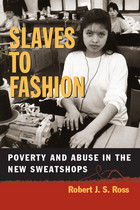
---Tom Hayden
"Slaves to Fashion is a remarkable achievement, several books in one: a gripping history of sweatshops, explaining their decline, fall, and return; a study of how the media portray them; an analysis of the fortunes of the current anti-sweatshop movement; an anatomy of the global traffic in apparel, in particular the South-South competition that sends wages and working conditions plummeting toward the bottom; and not least, a passionate declaration of faith that humanity can find a way to get its work done without sweatshops. This is engaged sociology at its most stimulating."
---Todd Gitlin
". . . unflinchingly portrays the reemergence of the sweatshop in our dog-eat-dog economy."
---Los Angeles Times
Just as Barbara Ehrenreich's Nickel and Dimed uncovered the plight of the working poor in America, Robert J. S. Ross's Slaves to Fashion exposes the dark side of the apparel industry and its exploited workers at home and abroad. It's both a lesson in American business history and a warning about one of the most important issues facing the global capital economy-the reappearance of the sweatshop.
Vividly detailing the decline and tragic rebirth of sweatshop conditions in the American apparel industry of the twentieth century, Ross explains the new sweatshops as a product of unregulated global capitalism and associated deregulation, union erosion, and exploitation of undocumented workers. Using historical material and economic and social data, the author shows that after a brief thirty-five years of fair practices, the U.S. apparel business has once again sunk to shameful abuse and exploitation.
Refreshingly jargon-free but documented in depth, Slaves to Fashion is the only work to estimate the size of the sweatshop problem and to systematically show its impact on apparel workers' wages. It is also unique in its analysis of the budgets and personnel used in enforcing the Fair Labor Standards Act.
Anyone who is concerned about this urgent social and economic topic and wants to go beyond the headlines should read this important and timely contribution to the rising debate on low-wage factory labor.

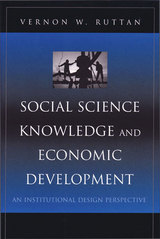
With its emphasis on interdisciplinarity, Social Science Knowledge and Economics Developmentis important reading for social scientists, development economists, and in the development studies classroom.
Vernon W. Ruttan is Regents Professor Emeritus in the Department of Applied Economics at the University of Minnesota.


According to the authors of this important new study, the answer to these questions is a resounding no. In Social Security: The Phony Crisis, economists Dean Baker and Mark Weisbrot argue that there is no economic, demographic, or actuarial basis for the widespread belief that the program needs to be fixed.
As the authors emphasize, there is virtually no disagreement about the facts of Social Security's finances, or even the projections for its future. Rather, the Social Security debate has been foundering on misconceptions, confusion, and lack of agreement on the meaning of crucial terms.
The authors also take on related issues: that privatization would help save Social Security, that America has a pressing need to increase its national savings, and that future generations will suffer from the costs—especially for health care—of supporting a growing elderly population.
As New York Times columnist Fred Brock recently wrote, "So-called reform of the Social Security system is looking more and more like a solution in search of a problem." In this accessible and insightful work, Baker and Weisbrot seek to cut through some of the myths and fallacies surrounding this crucial policy issue.
"Dean Baker and Mark Weisbrot have no trouble at all demonstrating that even on highly conservative assumptions about economic growth, the much-forecast insolvency of the Social Security system by about 2030 is most unlikely to happen then, if indeed ever."—The Economist
"The authors challenge basic assumptions with vigor and intelligence. . . . An absolutely relevant and important analysis, presented with force and clarity, that asks, basically, what kind of a nation we really are."—Kirkus Reviews
"Proponents—like George W. Bush—of Social Security privatization . . . typically ignore prospects for a stagnant or falling stock market. In Social Security: The Phony Crisis, [Baker and Weisbrot] show how a falling stock market could place pressure on both future Social Security payments and privatization schemes because earnings from the trust fund could actually fall."—Jeff Madrick, New York Review of Books

The Solutions Manual to Elements of Econometrics, Second Edition provides chapter solutions to the exercises in the college textbook: Elements of Econometrics, Second Edition by Jan Kmenta.
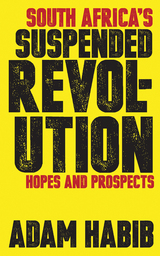
South Africa’s Suspended Revolution tells the story of South Africa’s democratic transition and the prospects for the country to develop a truly inclusive political system. Beginning with an account of the transition in the leadership of the African National Congress from Thabo Mbeki to Jacob Zuma, the book then broadens its lens to examine the relationship of South Africa’s political elite to its citizens. It also examines the evolution of economic and social policies through the democratic transition, as well as the development of a postapartheid business community and a foreign policy designed to re-engage South Africa with the world community.
Written by one of South Africa’s leading scholars and political commentators, the book combines historical and contemporary analysis with strategies for an alternative political agenda. Adam Habib connects the lessons of the South African experience with theories of democratic transition, social change, and conflict resolution. Political leaders, scholars, students, and activists will all find material here to deepen their understanding of the challenges and opportunities of contemporary South Africa.

Dr. Nguyen Anh Tuan, former Minister of Finance of the Republic of South Vietnam, addresses a common perception of Vietnam: that South Vietnam was a fragmented society which did not deserve to succeed because of its internal weaknesses. According to Tuan, however, South Vietnam in the last decade of its life developed considerable governmental cohesion and internal social strength. Before the final failure of will, the South and its defenders were well on the way to becoming a viable society that had managed with American assistance to lift itself by its bootstraps to the point to economic take-off. Tuan argues that South Vietnam’s fall was not inevitable. This controversial book will be of great interest to all those concerned with the Vietnamese experience during the period 1954-1975.


The contributors to Sport and the Neoliberal University examine how intercollegiate athletics became a contested terrain of public/private interests. They look at college sports from economic, social, legal, and cultural perspectives to cut through popular mythologies regarding intercollegiate athletics and to advocate for increased clarity about what is going on at a variety of campuses with regard to athletics. Focusing on current issues, including the NCAA, Title IX, recruitment of high school athletes, and the Penn State scandal, among others, Sport and the Neoliberal University shows the different ways institutions, individuals, and corporations are interacting with university athletics in ways that are profoundly shaped by neoliberal ideologies.
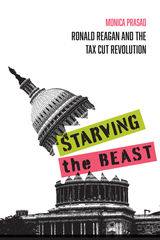
Drawing on never-before seen archival documents, Prasad traces the history of the 1981 tax cut—the famous “supply side” tax cut, which became the cornerstone for the next several decades of Republican domestic economic policy. She demonstrates that the main impetus behind this tax cut was not business group pressure, racial animus, or a belief that tax cuts would pay for themselves.
Rather, the tax cut emerged because in America--unlike in the rest of the advanced industrial world—progressive policies are not embedded within a larger political economy that is favorable to business. Since the end of World War II, many European nations have combined strong social protections with policies to stimulate economic growth such as lower taxes on capital and less regulation on businesses than in the United State. Meanwhile, the United States emerged from World War II with high taxes on capital and some of the strongest regulations on business in the advanced industrial world. This adversarial political economy could not survive the economic crisis of the 1970s.
Starving the Beast suggests that taking inspiration from the European model of progressive policies embedded in market-promoting political economy could serve to build an American economy that works better for all.
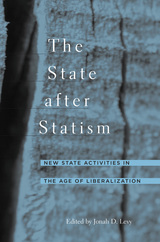
This book assesses the changing nature of state intervention in the economies of the affluent democracies. Against a widespread understanding that contemporary developments, such as globalization and new technologies, are pressing for a rollback of state regulation in the economy, the book shows that these same forces are also creating new demands and opportunities for state intervention. Thus, state activism has shifted, rather than simply eroded.
State authorities have shifted from a market-steering orientation to a market-supporting one. Chief among the new state missions are: repairing the main varieties of capitalism (liberal, corporatist, and statist); making labor markets and systems of social protection more employment-friendly; recasting regulatory frameworks to permit countries to cross major economic and technological divides; and expanding market competition at home and abroad.
Because the changes from market steering to market support are so controversial and far-reaching, state officials often find themselves making choices that produce clear winners and losers. Such choices require a capacity to act unilaterally and decisively, even in the face of substantial societal opposition. As a result, state activism, autonomy, and occasionally imposition remain essential for meeting the challenges of today's globalizing economy.

With the growing debate about the effect of financial interdependence on the ability of states to conduct economic policy and indeed to preserve their independence in the face of unprecedented economic linkages, this book will be of interest to political scientists and economists as well as policy makers concerned with the impact of financial globalization and the causes of differentials in access to capital.
Andrew C. Sobel is Assistant Professor of Political Science and Resident Fellow, Center in Political Economy, Washington University, St. Louis. He is the author of Domestic Choices, International Markets: Dismantling National Barriers and Liberalizing Securities Markets.

A long-overdue guide on how to use statistics to bring clarity, not confusion, to policy work.
Statistics are an essential tool for making, evaluating, and improving public policy. Statistics for Public Policy is a crash course in wielding these unruly tools to bring maximum clarity to policy work. Former White House economist Jeremy G. Weber offers an accessible voice of experience for the challenges of this work, focusing on seven core practices:
- Thinking big-picture about the role of data in decisions
- Critically engaging with data by focusing on its origins, purpose, and generalizability
- Understanding the strengths and limits of the simple statistics that dominate most policy discussions
- Developing reasons for considering a number to be practically small or large
- Distinguishing correlation from causation and minor causes from major causes
- Communicating statistics so that they are seen, understood, and believed
- Maintaining credibility by being right (or at least respectably wrong) in every setting
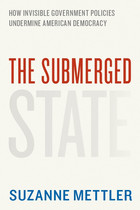
“Keep your government hands off my Medicare!” Such comments spotlight a central question animating Suzanne Mettler’s provocative and timely book: why are many Americans unaware of government social benefits and so hostile to them in principle, even though they receive them? The Obama administration has been roundly criticized for its inability to convey how much it has accomplished for ordinary citizens. Mettler argues that this difficulty is not merely a failure of communication; rather it is endemic to the formidable presence of the “submerged state.”
In recent decades, federal policymakers have increasingly shunned the outright disbursing of benefits to individuals and families and favored instead less visible and more indirect incentives and subsidies, from tax breaks to payments for services to private companies. These submerged policies, Mettler shows, obscure the role of government and exaggerate that of the market. As a result, citizens are unaware not only of the benefits they receive, but of the massive advantages given to powerful interests, such as insurance companies and the financial industry. Neither do they realize that the policies of the submerged state shower their largest benefits on the most affluent Americans, exacerbating inequality. Mettler analyzes three Obama reforms—student aid, tax relief, and health care—to reveal the submerged state and its consequences, demonstrating how structurally difficult it is to enact policy reforms and even to obtain public recognition for achieving them. She concludes with recommendations for reform to help make hidden policies more visible and governance more comprehensible to all Americans.
The sad truth is that many American citizens do not know how major social programs work—or even whether they benefit from them. Suzanne Mettler’s important new book will bring government policies back to the surface and encourage citizens to reclaim their voice in the political process.

Antibiotics are powerful drugs that can prevent and treat infections, but they are becoming less effective as a result of drug resistance. Resistance develops because the bacteria that antibiotics target can evolve ways to defend themselves against these drugs. When antibiotics fail, there is very little else to prevent an infection from spreading.
Unnecessary use of antibiotics in both humans and animals accelerates the evolution of drug-resistant bacteria, with potentially catastrophic personal and global consequences. Our best defenses against infectious disease could cease to work, surgical procedures would become deadly, and we might return to a world where even small cuts are life-threatening. The problem of drug resistance already kills over one million people across the world every year and has huge economic costs. Without action, this problem will become significantly worse.
Following from their work on the Review on Antimicrobial Resistance, William Hall, Anthony McDonnell, and Jim O’Neill outline the major systematic failures that have led to this growing crisis. They also provide a set of solutions to tackle these global issues that governments, industry, and public health specialists can adopt. In addition to personal behavioral modifications, such as better handwashing regimens, Superbugs argues for mounting an offense against this threat through agricultural policy changes, an industrial research stimulus, and other broad-scale economic and social incentives.

What has happened to cities after the global economic recession? Sustaining Cities answers this question by explaining how failed governmental policies contributed to urban problems and offering best practices for solving them.
From social scientists and urban planners to architects and literary and film critics, the authors of this unique collection suggest real responses to this crisis. Could the drastic declines in housing markets have been avoided? Yes, if we reframe our housing values. Do you want to attract corporate investment to your town? You might want to think twice about doing so. The extinction of the “Celtic Tiger” may be charted in statistics, but the response in popular Irish mystery novels is much more compelling. China, while not immune to market vicissitudes, still booms, but at a considerable cost to its urban identities.
Whether constructing a sustainable social framework for Mexican mega-cities or a neighborhood in London, these nine essays consider some strikingly similar strategies. And perhaps, as the contributors suggest, it’s time to look beyond the usual boundaries of urban, suburban, and exurban to forge new links among these communities that will benefit all citizens. Accessible to anyone with an interest in how cities cope today, Sustaining Cities presents a cautionary tale with a hopeful ending.
READERS
Browse our collection.
PUBLISHERS
See BiblioVault's publisher services.
STUDENT SERVICES
Files for college accessibility offices.
UChicago Accessibility Resources
home | accessibility | search | about | contact us
BiblioVault ® 2001 - 2024
The University of Chicago Press









